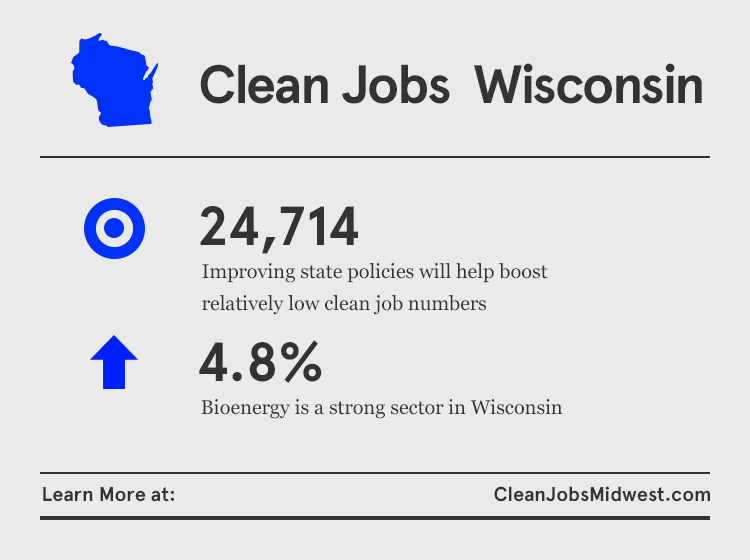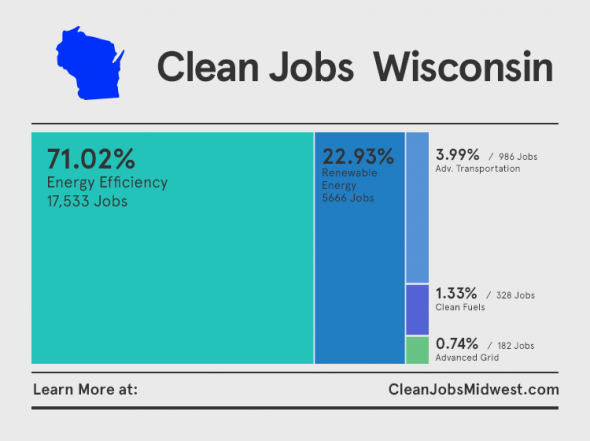New Report: Nearly 25,000 Clean Energy Workers in Wisconsin
Projected 2016 Growth Rate of 4.8 Percent; Milwaukee, Rural Areas Each Account for Quarter of State’s Jobs; Energy Efficiency, Renewables Standards Could Create Even More Opportunities
MADISON (March 22, 2016) – Nearly 25,000 people work in Wisconsin’s clean energy industry, according to a comprehensive analysis unveiled today by RENEW Wisconsin, Clean Energy Trust and Environmental Entrepreneurs (E2).
The analysis – available at www.CleanJobsMidwest.com – is based on U.S. Bureau of Labor Statistics data and a comprehensive survey of thousands of businesses across Wisconsin and the 12-state Midwest region. The Clean Jobs Midwest report provides detailed breakdowns of clean energy jobs not available previously – including job totals for every county, congressional district and state legislative district in Wisconsin.
“As a leading wind tower manufacturer in the U.S., Broadwind draws on Wisconsin’s deep manufacturing heritage to fabricate wind turbine towers in our Manitowoc facility,” said Eric Blashford, president of Broadwind Towers and Heavy Industries, referring to the company’s Wisconsin location on Lake Michigan between Milwaukee and Green Bay.
“This same facility that once built submarines for World War II currently employs nearly 300 people in Manitowoc, most of whom are high-skilled manufacturing staff receiving competitive pay and a good benefits package.
“As Wisconsin transitions to a clean energy economy, many more of these well-paying jobs will be created throughout the supply chain helping Wisconsinites make a good, stable living,” Blashford said.
Energy efficiency is by far the largest clean energy sector employer in the state, with more than 17,000 people, or nearly 71 percent of the clean energy workforce, employed in areas such as high-efficiency lighting, Energy Star appliance manufacturing and high-efficiency HVAC services to reduce wasted energy in homes, schools and businesses.
According to the findings, the renewable energy industry accounts for about one in four clean energy workers in Wisconsin, or more than 5,600 jobs – including about 3,700 in solar, 1,100-plus in biomass and nearly 600 in wind. Wisconsin is one of two Midwestern states with more than 20 percent of its renewable energy generation coming from biomass.
“Wisconsin’s clean energy workers make up an important and growing sector of our economy,” said Tyler Huebner, executive director of RENEW Wisconsin. “Our last major state energy policy advancement was made ten years ago now, and although we met the goals including 10 percent renewable electricity by 2015, that policy is no longer driving investment. A new policy framework for advancing 21st-century energy solutions would create even more clean energy employment and help us catch up with our neighboring states. Clean energy policies drive job growth across the Midwest and have the potential to help create thousands of good-paying jobs in Wisconsin as well,” Huebner said.
The report also found:
- Most clean energy jobs in Wisconsin – nearly 7,500 – are found in rural areas and non-metropolitan statistical areas. The greater Milwaukee area boasts nearly 6,500 clean energy jobs.
- In contrast to Governor Scott Walker’s policy opposing the federal Clean Power Plan, nearly 68 percent of clean energy businesses in the state believe the Clean Power Plan would increase business prospects.
- Clean energy employs nearly 569,000 people across the 12-state Midwest region (Illinois, Indiana, Iowa, Kansas, Michigan, Minnesota, Missouri, Nebraska, North Dakota, Ohio, South Dakota, and Wisconsin).
“Clean energy is a dynamic sector and central to economic growth in the Midwest,” said Erik Birkerts, Chief Executive Officer of Clean Energy Trust. “Smart public policy will further accelerate the clean energy sector’s growth, which means thousands of new jobs created across the region and which will confer economic advantages on Wisconsin,” Birkerts continued.
RENEW Wisconsin leads and accelerates the transformation to Wisconsin’s renewable energy future through advocacy, education, and collaboration.
Clean Energy Trust (CET) fuels clean energy innovation in the Midwest. A Chicago-based non-profit, CET helps launch, fund and grow Midwest clean energy companies to ensure a more prosperous, sustainable future for generations to come. It does this through direct investment, commercialization assistance, mentorship, access to its broad partner network and the promotion of a supportive clean energy community and business climate. Learn more at http://www.cleanenergytrust.org.
Environmental Entrepreneurs (E2) is a national, nonpartisan group of business leaders, investors, and professionals from every sector of the economy who advocate for smart policies that are good for the economy and good for the environment. Our members have founded or funded more than 2,500 companies, created more than 600,000 jobs, and manage more than $100 billion in venture and private equity capital. For more information, see www.e2.org or follow us on Twitter at @e2org.
NOTE: This press release was submitted to Urban Milwaukee and was not written by an Urban Milwaukee writer. While it is believed to be reliable, Urban Milwaukee does not guarantee its accuracy or completeness.


























Thousands more jobs in WI would be created for intelligent comprehensive design and reconstruction of most buildings to include consumer energy efficiency, conservation methods, installing solar electric, energy storage in thermal mass furnaces, hot water heaters, plug in electric cars, ice making AC, on time of use rates and load controlled. This would reduce fossil fuel consumption by over 50% and save consumers $7 Billion annually.
Focus on Energy Funding should be increased three-fold, a sales tax exemption on materials made in Wisconsin and labor used for reconstruction work, and a carbon tax that would pay for intelligent reconstruction of roads and bridges, infrastructure, mass transit, bike and recreation trails, etc.
This would fuel regional jobs for decades. On a USA level, millions of jobs, and Trillions saved by consumers annually.